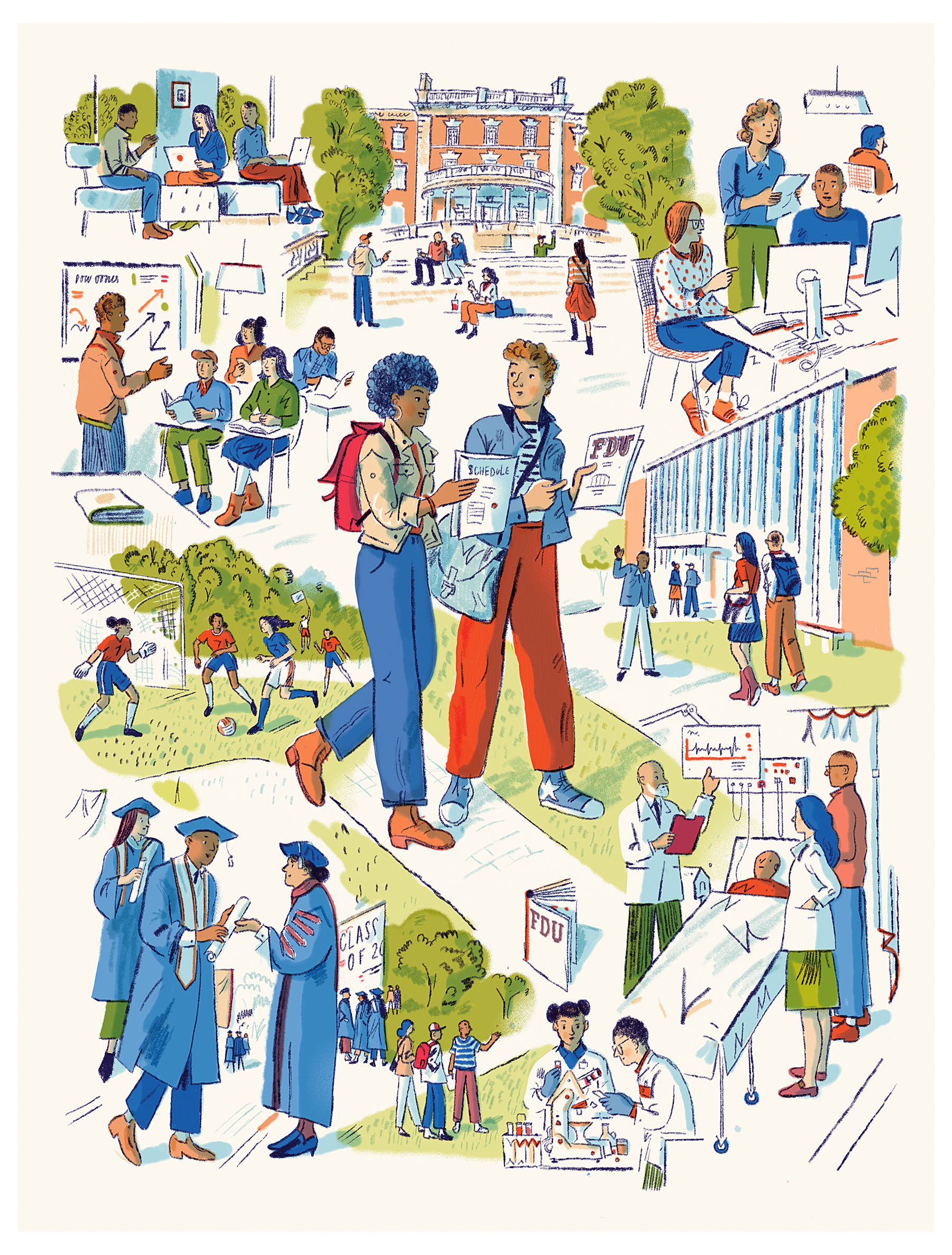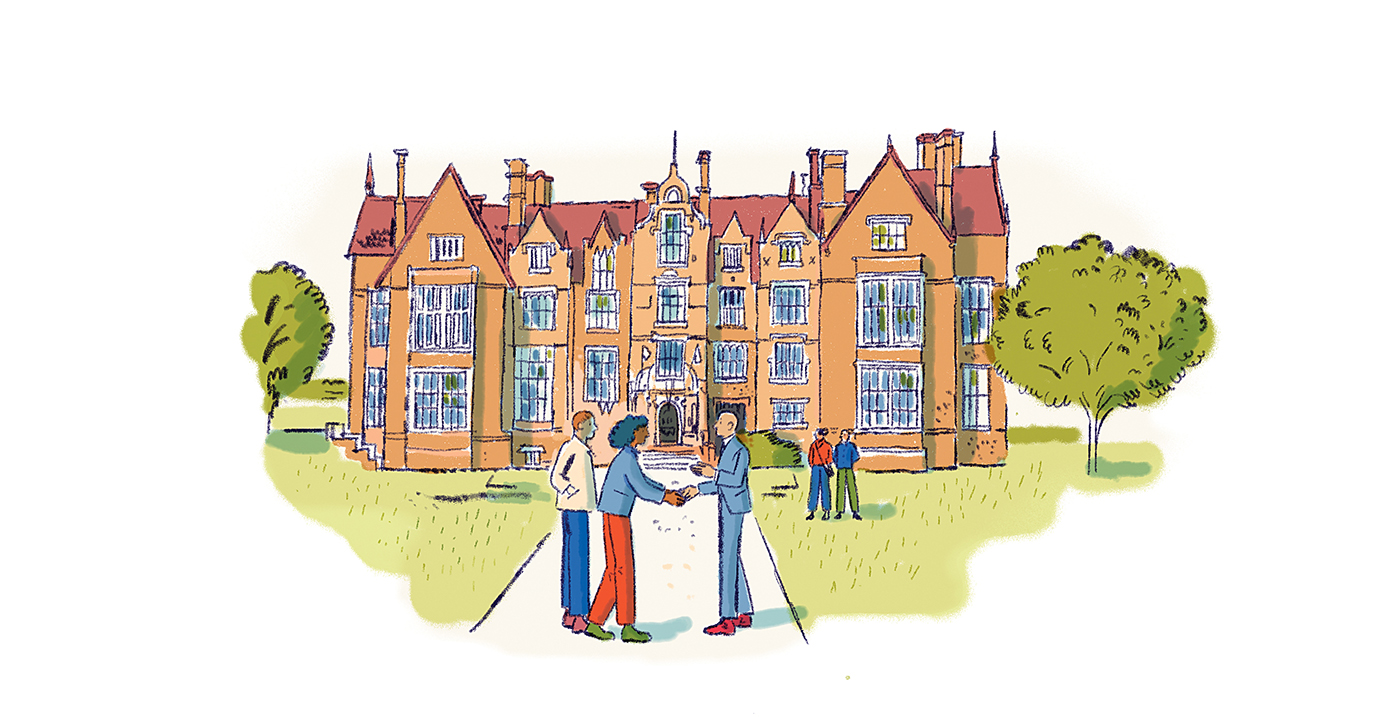Meeting the Moment

(Illustration: Peter Oumanski)
By Kenna Caprio
As the higher-education landscape continues to shift, Fairleigh Dickinson University is committed to strengthening its bond to students, faculty and alumni, providing the opportunity and education critical to future success, while also ensuring a prosperous path for the institution.
“We have a vision for the future of health care education,” says FDU President Michael Avaltroni. “The University will engender far-reaching impact by establishing a coalition of partner institutions and developing FDU’s campuses as hubs for lifelong learning, health and well-being.”
FDU HealthPath Forward is a purpose-driven initiative that will advance health care education, training and innovation, bringing together academic institutions, health care systems, clinical practitioners and industry leaders. The initiative builds on FDU’s well-established programs in health science education (now united under the umbrella of FDU Health) as well as programs that intersect closely with health care such as business, hospitality, engineering, cybersecurity and other disciplines.
“The health care industry is facing an urgent demand for skilled professionals,” Avaltroni adds. “FDU HealthPath Forward is our answer to this growing need — an innovative, interdisciplinary and community-driven approach to redefine how we train, educate and upskill the next generation of health care professionals.”
The first phase of the initiative will focus on establishing key partnerships (the FDU Healthcare Education Community Collaborative), launching new academic programs and opening the Healthcare Innovation Center — a dedicated research and development space where students, faculty and community partners will collaborate on breakthrough health care solutions.
“We want to bring many talented people together to create a unique environment where education, health care and innovation intersect to meet today’s challenges and build a better tomorrow,” Avaltroni says, adding that agreements are being coordinated with various health care systems and other organizations.
Other phases of the enterprise will expand workforce training programs, establish early pipeline programs, enhance research initiatives and integrate cutting-edge technology into health care education.
In two related initiatives this spring, FDU opened the Dennis Turpan Research and Development Lab for Cutting-edge Technologies and Disciplines, and the FDU Health Connected Care & Innovation Lab — both designed to use technology in an innovative way to train students, build real-world skills and improve lives.

(Illustration: Peter Oumanski)
To better align FDU for future success, the University has made the difficult but necessary decision to streamline some academic majors and programs as the culmination of a process of analysis and consultation with the faculty.
While FDU will continue to offer a range of academic programs and majors, the path forward will center on opportunities that align with and address workforce needs, with an emphasis on health sciences, health-related fields and broader career-focused offerings.
“The discontinuation of select academic programs will help better define the focus of the institution,” says Avaltroni. “Colleges simply cannot be all things to all people. Ultimately, this change allows us to direct targeted resources to grow our flagship programs and to better support our students.”
The discontinued programs have faced low enrollment in recent years; 434 students are currently enrolled in these programs, approximately 5 percent of the University’s entire student population. The enrollment trends in these fields at FDU mirror enrollment trends in these same fields across the nation.
“Students will not be left behind,” says Avaltroni. “While FDU will cease enrolling new students in the discontinued programs effective immediately, the University will take appropriate measures so that current students in these programs receive the support and opportunity to complete their degrees.”
FDU’s current plans include continuing affected programs through June 30, 2027. Academic advisers are working closely with all affected students to provide options and support.
Among the undergraduate degree programs to be discontinued are — chemistry, creative writing, entrepreneurship, environmental studies, fine arts, government and law, history, literature, management, marine biology, philosophy, social studies, sociology and theater arts.
Graduate programs include — chemistry, communication, computer engineering, cosmetic science, creative writing, creative writing and literature for educators, digital marketing, e-commerce, electrical engineering, film, higher education administration, political science, supply chain management, taxation and teaching English as a second/foreign language, plus graduate certificates in diplomacy and international relations, global transportation and learning disabilities teacher consultant.
“Just because FDU will no longer award degrees in these majors, that does not mean students will not be able to take classes on these subjects,” Avaltroni says. “In fact, we encourage students to seek out classes in these areas as elective courses, to enhance their broad-based education.”
In several cases, the University has even created new concentrations and programs for students interested in these areas of study to consider.
“I am sorry that we will not be able to sustain all the programs we once did,” Avaltroni adds. “These programs have profoundly inspired and enabled many students to achieve wonderful things. These programs have long had great value, and they remain valuable areas of study,” he continues. “However, in today’s higher education environment it is not possible, and it does not serve our students well, to offer programs in every subject of interest. As we move ahead, we will never lose sight of FDU’s history and impact and the wonderful people who made those programs possible.”
Throughout the planning process, the University worked hard to minimize adverse impact on students, faculty and staff, and to produce a sustainable business model that will enable the institution to thrive.
Faculty were consulted about the affected programs and could make recommendations through their respective educational planning committees. The administration carefully considered these recommendations, and many were incorporated into the final plan that was approved by the Board of Trustees.
The University also offered a voluntary retirement option to faculty, thereby reducing the overall number of faculty impacted. FDU also will look to redirect faculty and staff to other responsibilities or positions, when possible.
The University then aligned the academic structure with the program offerings, a process led by elected faculty leaders. The new structure features six colleges with three under the new division of FDU Health (Henry P. Becton College of Nursing and Allied Health, College of Pharmacy and Health Sciences and College of Psychology and Counseling). The three other colleges are the Maxwell Becton College of Liberal Arts and Education, the Gregory H. Olsen College of Engineering and Science and the Silberman College of Business.
“As a former student, I love FDU deeply, and I understand the magnitude of this change and the passion people feel,” says Avaltroni. “These decisions, while not easy, provide us an opportunity to achieve a new level of excellence, a more defined purpose in addressing societal needs and a more transformative role in the lives of our students.”

(Illustration: Peter Oumanski)
Fairleigh Dickinson University has entered into a preliminary agreement with a group of FDU alumni to transfer ownership of Wroxton College. The agreement will preserve the rich academic program and transformational study-abroad experience that has benefitted thousands of students in the last 60 years.
Once the agreement is in place, FDU will continue operating the academic program through May 2026 while the new team finalizes plans to assume all responsibilities for Wroxton.
“We are confident that the future of Wroxton College will be in good hands with a team committed to preserving its legacy and developing an even more successful program for generations to come,” says University President Michael Avaltroni.
The president added that once the transition is complete, FDU will remain closely connected to Wroxton, and that students will still be able to study abroad at the college.
He said this partnership demonstrates “the incredible commitment and passion of our alumni and offers critical benefits to both FDU and Wroxton College.” Under the envisioned partnership, FDU and its students will continue to have access to the college; its programs will be offered in a similar manner; alumni will have an influential role in shaping Wroxton’s future; the college’s faculty and staff will remain in place; and the University will benefit from financial relief that will strengthen the institution.
“As Wroxton embarks on this next chapter, its mission will remain rooted in the values that have long defined its impact: preserving the unique educational experience shaped by Wroxton Abbey and its grounds, fostering a close-knit, intellectually vibrant community, and expanding access to immersive global learning,” says Lakshman Achuthan, BS’89 (Ruth). “A core part of this new direction is the growing leadership of Wroxton alumni, whose first-hand experience of the college’s impact uniquely positions them to help guide its future. In the months ahead, we will focus on laying the groundwork for Wroxton’s long-term success.”
The alumni members of the Wroxton Advisory Committee who led the negotiations thanked FDU and expressed their commitment to building a strong future for Wroxton College. “We are deeply grateful to Fairleigh Dickinson University for its stewardship of Wroxton over the past six decades and for working collaboratively with us to help structure an arrangement that, when finalized, will secure Wroxton’s future,” says Kenneth Malagiere, BA’05, MA’24 (Metro), chair of the Wroxton Advisory Committee.